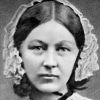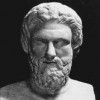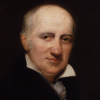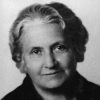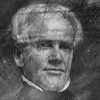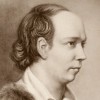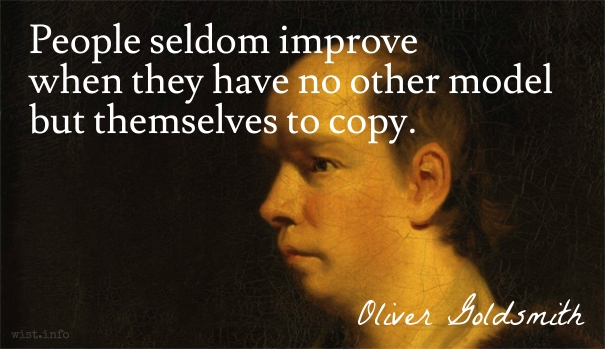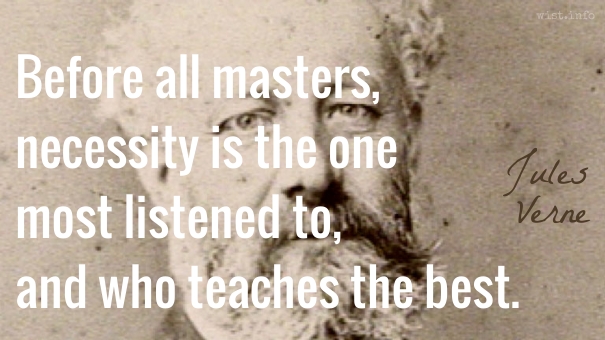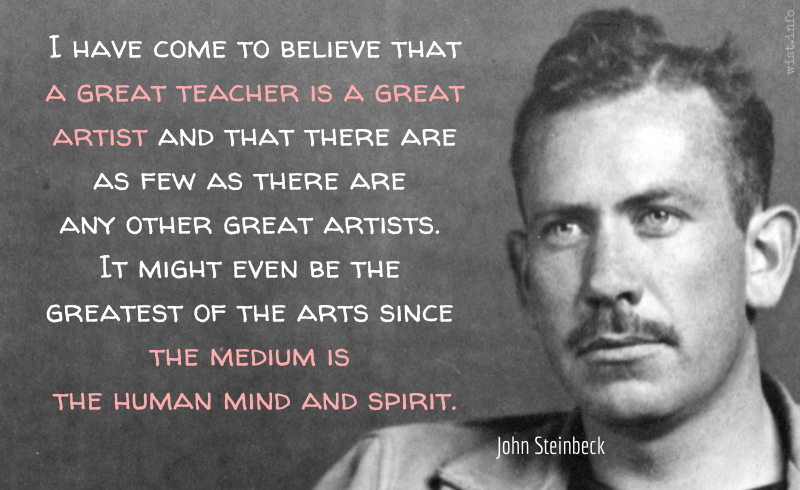Teachers are expected to reach unattainable goals with inadequate tools. The miracle is that at times they accomplish this impossible task.
Haim Ginott (1922-1973) Israeli-American school teacher, child psychologist, psychotherapist [b. Haim Ginzburg]
Teacher and Child, Preface (1972)
(Source)
Quotations about:
teacher
Note not all quotations have been tagged, so Search may find additional quotes on this topic.
I have come to the frightening conclusion that I am the decisive element in the classroom. It is my personal approach that creates the climate. It is my daily mood that makes the weather. As a teacher, I possess a tremendous power to make a child’s life miserable or joyous. I can be a tool of torture or an instrument of inspiration. I can humiliate or humor, hurt or heal. In all situations, it is my response that decides whether a crisis will be escalated or de-escalated, a child humanized or de-humanized.
Haim Ginott (1922-1973) Israeli-American school teacher, child psychologist, psychotherapist [b. Haim Ginzburg]
Teacher and Child, Preface (1972)
(Source)
Quoting his writing as a young teacher.
My first job after college was as a teacher in Cotulla, Texas, in a small Mexican-American school. Few of them could speak English, and I couldn’t speak much Spanish. My students were poor and they often came to class without breakfast, hungry. They knew even in their youth the pain of prejudice. They never seemed to know why people disliked them. But they knew it was so, because I saw it in their eyes. I often walked home late in the afternoon, after the classes were finished, wishing there was more that I could do. But all I knew was to teach them the little that I knew, hoping that it might help them against the hardships that lay ahead.
Somehow you never forget what poverty and hatred can do when you see its scars on the hopeful face of a young child.Lyndon B. Johnson (1908-1973) American politician, educator, US President (1963-69)
Speech (1965-03-15), “The American Promise,” Joint Session of Congress [40:55]
(Source)
Shall I tell you the secret of the true scholar? It is this: Every man I meet is my master in some point, and in that I learn of him.
Ralph Waldo Emerson (1803-1882) American essayist, lecturer, poet
“Greatness,” Letters and Social Aims (1876)
(Source)
This appears to be the origin of the much more common paraphrase (not found in Emerson's works, but popularized by Dale Carnegie in How to Win Friends and Influence People (1936)): "In my walks, every man I meet is my superior in some way, and in that, I learn from him."
You are the sun who heals all clouded sight.
Solving my doubts, you bring me such content
That doubt, no less than knowing, is delight.[O sol che sani ogne vista turbata,
tu mi contenti sì quando tu solvi,
che, non men che saver, dubbiar m’aggrata.]Dante Alighieri (1265-1321) Italian poet
The Divine Comedy [Divina Commedia], Book 1 “Inferno,” Canto 11, l. 91ff (11.91-93) [Dante] (1309) [tr. Kirkpatrick (2006)]
(Source)
Flattering Virgil before he asks another question. (Source (Italian)). Alternate translations:
O you, who like the Sun each weaken'd sight
Relieve, and give such pleasure when you clear
My doubts, that I to raise them oft desire.
[tr. Rogers (1782), l. 89ff]
Can I repent my doubts! illumin'd Bard,
When thus thy heav'nly words my doubts reward?
[tr. Boyd (1802), st. 14]
O Sun! who healest all imperfect sight,
Thou so content’st me, when thou solv’st my doubt,
That ignorance not less than knowledge charms.
[tr. Cary (1814)]
O Sun, that healest every troubled sight!
So full content, thou solving, doth ensue,
Glads me no less to doubt, than judge aright.
[tr. Dayman (1843)]
O Sun! who healest all troubled vision, thou makest so glad when thou resolvest me, that to doubt is not less grateful than to know.
[tr. Carlyle (1849)]
Thou sun, that clearest every clouded sight,
You so content me to dissolve the knot,
To know is scarce so pleasing as to doubt.
[tr. Bannerman (1850)]
Oh, sun! thou healer of the troubled sight,
What thou declarest makes me so content,
That as in knowledge I rejoice in doubt.
[tr. Johnston (1867)]
O Sun, that healest all distempered vision,
Thou dost content me so, when thou resolvest,
That doubting pleases me no less than knowing!
[tr. Longfellow (1867)]
O Sun that healest every troubled sight, so dost thou content me when thou solvest, that doubting gives me no less pleasure than knowing.
[tr. Butler (1885)]
O Sun, that healest every troubled sight.
Thou so contentest me when thou mak'st clear
Doubts, that no less than knowledge they delight.
[tr. Minchin (1885)]
O Sun that healest every troubled vision, thou dost content me so, when thou explainest, that doubt, not less than knowledge, pleaseth me.
[tr. Norton (1892)]
O sun, that bringest healing unto all clouded vision, thou grantest unto me such satisfaction in thine unravelling, that doubting doth delight me.
[tr. Sullivan (1893)]
Oh! sun, who makest whole all troubled vision.
Thou dost content me so when thou resolvest
That doubt is joy to me, no less than knowledge.
[tr. Griffith (1908)]
O Sun that healest all troubled sight, so dost thou satisfy me with the resolving of my doubts that it is no less grateful to me to question than to know.
[tr. Sinclair (1939)]
O Sun, who heal'st all troubled vision, and so
Contentest me where thou doest certify,
That to doubt pleaseth not less than to know ....
[tr. Binyon (1943)]
O Sun that healest all dim sight, thou so
Doest charm me in resolving of my doubt,
To be perplexed is pleasant as to know.
[tr. Sayers (1949)]
O sun which clears all mists from troubled sight,
such joy attends your rising that I feel
as grateful to the dark as to the light.
[tr. Ciardi (1954)]
O sun that heal every troubled vision, you do content me so, when you solve, that questioning, no less than knowing, pleases me.
[tr. Singleton (1970)]
O sun that shines to clear a misty vision,
such joy is mine when you resolve my doubts
that doubting pleases me no less than knowing!
[tr. Musa (1971)]
O sun that heals all sight that is perplexed,
when I ask you, your answer so contents
that doubting pleases me as much as knowing.
[tr. Mandelbaum (1980)]
O sun who clears every obscure perception
You give such satisfaction when you enlighten me
That, not less than knowledge, doubt is agreeable.
[tr. Sisson (1981)]
O sun, that makes all troubled vision clear,
You give solutions I am so contented with
That asking, no less than knowing, pleases me.
[tr. Pinsky (1994), l. 87ff]
O sun that heals every clouded sight, you content me so when you resolve questions, that doubting is no less pleasurable than knowing.
[tr. Durling (1996)]
O Sun, that heals all troubled sight, you make me so content when you explain to me, that to question is as delightful as to know.
[tr. Kline (2002)]
O sun, you who heal all troubled sight,
you so content me by resolving doubts
it pleases me no less to question than to know.
[tr. Hollander/Hollander (2007)]
O shining sun, healer of troubled vision,
I'm satisfied so well, my mind so settled,
That knowledge pleases me no more than asking questions!
[tr. Raffel (2010)]
"Bright sun," I said, you calm these doubts of mine
As you heal any troubled sight. Such ease
You bring me that to question pleases me
Like being answered."
[tr. James (2013)]
Even when it comes to learning, the good student contradicts his teacher and makes him more eager to explain and defend the truth. Challenge someone discreetly and his teaching will be more perfect.
[Y aun para el aprender es treta del discípulo contradecir al maestro, que se empeña con más conato en la declaración y fundamento de la verdad; de suerte que la impugnación moderada da ocasión a la enseñanza cumplida.]
Baltasar Gracián y Morales (1601-1658) Spanish Jesuit priest, writer, philosopher
The Art of Worldly Wisdom [Oráculo Manual y Arte de Prudencia], § 213 (1647) [tr. Maurer (1992)]
(Source)
(Source (Spanish)). Alternate translations:
In matter of learning it is a cunning fetch in the Schollar to contradict his Master, inasmuch as it lays an obligation upon him, to labour to explain the truth with greater perspicuity and solidity.) So that moderate contradiction gives him that teaches occasion to teach thoroughly.
[Flesher ed. (1685)]
Also in learning it is a subtle plan of the pupil to contradict the master, who thereupon takes pains to explain the truth more thoroughly and with more force, so that a moderate contradiction produces complete instruction.
[tr. Jacobs (1892)]
A good trick on the party of the pupil is to bait his teacher, who thereby excites himself to greater effort in the declaration, and the foundations of this beliefs, whence it comes that well-moderated debate makes for most effective teaching.
[tr. Fischer (1937)]
In pursuit of virtue, do not be afraid to overtake your teacher.
[當仁、不讓於師。]
[当仁不让于师]Confucius (c. 551- c. 479 BC) Chinese philosopher, sage, politician [孔夫子 (Kǒng Fūzǐ, K'ung Fu-tzu, K'ung Fu Tse), 孔子 (Kǒngzǐ, Chungni), 孔丘 (Kǒng Qiū, K'ung Ch'iu)]
The Analects [論語, 论语, Lúnyǔ], Book 15, verse 36 (15.36) (6th C. BC – 3rd C. AD) [tr. Leys (1997)]
(Source)
(Source (Chinese) 1, 2). Modern numbering is 15.36; exceptions (mostly after Legge) noted below. Alternate translations:
Let every man consider virtue as what devolves on himself. He may not yield the performance of it even to his teacher.
[tr. Legge (1861), 15.35]
Rely upon good-nature. 'Twill not allow precedence (even) to a teacher.
[tr. Jennings (1895), 15.35]
When the question is one of morality, a man need not defer to his teacher.
[tr. Ku Hung-Ming (1898), 15.35]
He upon whom a Moral duty devolves should not give way even to his Master.
[tr. Soothill (1910), 15.35]
He who has undertaken the way of Virtue does not yield place to his Teacher.
[tr. Soothill (1910), 15.35, alternate]
Manhood’s one's own, not leavable to teacher.
[tr. Pound (1933), 15.35]
When it comes to Goodness one need not avoid competing with one's teacher.
[tr. Waley (1938), 15.35]
He who is manhood at its best does not make way for the teacher.
[tr. Ware (1950)]
When faced with the opportunity to practice benevolence do not give precedence even to your teacher.
[tr. Lau (1979)]
When one is confronted by humaneness, one does not yield precedence to one's teacher.
[tr. Dawson (1993)]
Confronting an act of humanity, do not yield the precedence even to your teacher.
[tr. Huang (1997)]
One should not decline modestly to one's teacher when one faces the benevolent thing.
[tr. Cai/Yu (1998), # 420]
In striving to be authoritative in your conduct (ren), do not yield even to your teacher.
[tr. Ames/Rosemont (1998)]
With (ren), one need not defer to one's teacher.
[tr. Brooks/Brooks (1998)]
Abide in Humanity, and you need not defer to any teacher.
[tr. Hinton (1998)]
When it comes to being Good, defer to no one, not even your teacher.
[tr. Slingerland (2003)]
In matters of humaneness, do not defer even to your teacher.
[tr. Watson (2007)]
When encountering matters that involve the question of humaneness, do not yield even to your teacher.
[tr. Annping Chin (2014)]
When confronted with a challenge of upholding Ren virtue or not, one should not yield -- not even to his own teacher.
[tr. Li (2020), 15.37]
In discussion it is not so much weight of authority as force of argument that should be demanded. Indeed the authority of those who profess to teach is often a positive hindrance to those who wish to learn; they cease to employ their own judgment, and take what they perceive to be the verdict of their chosen master as settling the question.
[Non enim tam auctoritatis in disputando quam rationis momenta quaerenda sunt. Quin etiam obest plerumque iis qui discere volunt auctoritas eorum qui se docere profitentur; desinunt enim suum iudicium adhibere, id habent ratum quod ab eo quem probant iudicatum vident.]
Marcus Tullius Cicero (106-43 BC) Roman orator, statesman, philosopher
De Natura Deorum [On the Nature of the Gods], Book 1, ch. 5 / sec. 10 (1.10) (45 BC) [tr. Rackham (1933)]
(Source)
(Source (Latin)). Alternate translation:
For the force of reason in disputation is to be sought after rather than authority, since the authority of the teacher is often a disadvantage to those who are willing to learn; as they refuse to use their own judgment, and rely implicitly on him whom they make choice of for a preceptor.
[tr. Yonge (1877)]
In discussion it is not so much authorities as determining reasons that should be looked for. In fact the authority of those who stand forward as teachers is generally an obstacle in the way of those who wish to learn, for the latter cease to apply their own judgment, and take for granted the conclusions which they find arrived at by the teacher whom they approve.
[tr. Brooks (1896)]
For when we engage in argument we must look to the weight of reason rather than authority. Indeed, students who are keen to learn often find the authority of those who claim to be teachers to be an obstacle, for they cease to apply their own judgement and regard as definitive the solution offered by the mentor of whom they approve.
[tr. Walsh (2008)]
Perhaps it is not true to speak of God as a judge at all, or of his judgements. There does not seem to be really any evidence that His worlds are places of trial but rather schools, place of training, or that He is a judge but rather a Teacher, a Trainer, not in the imperfect sense in which men are teachers, but in the sense of His contriving and adapting His whole universe for one purpose of training every intelligent being to be perfect.
Florence Nightingale (1820-1910) English social reformer, statistician, founder of modern nursing
“Note on God and judgment”
(Source)
In Lynn McDonald, Ed., Florence Nightingale's Theology: Essays, Letters, and Journal Notes (2002), noted as "ADD MSS 45783 ff65-67".
Teaching takes skill and education and dedication. Home schooling as an idea is on a par with home dentistry.
Dick Cavett (b. 1936) American writer and critic
“Schooling Santorum,”New York Times (24 Feb 2012)
(Source)
The distinction I am making — between studying astrology and proselytizing for it — is crucial and can be generalized; it shows us where the line between the responsible and irresponsible practice of academic freedom should always be drawn. Any idea can be brought into the classroom if the point is to inquire into its structure, history, influence and so forth. But no idea belongs in the classroom if the point of introducing it is to recruit your students for the political agenda it may be thought to imply.
Stanley Fish (b. 1938) American literary theorist, legal scholar, author
“Conspiracy Theories 101,” New York Times (23 Jul 2006)
(Source)
I was a model child. It was the teacher’s mistake I am sure. The box was drawn on the blackboard and the names of misbehaving children were written in it. As I adored my teacher, Miss Smith, I was destroyed to see my name appear. This was just the first of the many humiliations of my youth that I’ve tried to revenge through my writing. I have never fully exorcised shames that struck me to the heart as a child except through written violence, shadowy caricature, and dark jokes.
Louise Erdrich (b. 1954) American author, poet
Interview with Lisa Halliday, “The Art of Fiction” #208, The Paris Review (Winter 2010)
(Source)
On the inspiration behind Dot Adare's 1st Grade teacher putting her into the "naughty box" in The Beet Queen (1986).
EPOPS: You’re mistaken: men of sense often learn from their enemies. Prudence is the best safeguard. This principle cannot be learned from a friend, but an enemy extorts it immediately. It is from their foes, not their friends, that cities learn the lesson of building high walls and ships of war. And this lesson saves their children, their homes, and their properties.
CHORUS [LEADER]: It appears then that it will be better for us to hear what they have to say first; for one may learn something at times even from one’s enemies.
Aristophanes (c. 450-c. 388 BC) Athenian comedic playwright
The Birds, l. 375ff (414 BC) [tr. Anon. (1812), Ramage (1864)]
(Source)
Alt. trans. [Hickie (1853)]:
EPOPS: Yet, certainly, the wise learn many things from their enemies; for caution preserves all things. From a friend you could not learn this, but your foe immediately obliges you to learn it. For example, the states have learned from enemies, and not from friends, to build lofty walls, and to possess ships of war. And this lesson preserves children, house, and possessions.
CHORUS [LEADER]: It is useful, as it appears to me, to hear their arguments first; for one might learn some wisdom even from one's foes.
Alt. trans. [O'Neill (1938)]:
EPOPS: The wise can often profit by the lessons of a foe, for caution is the mother of safety. It is just such a thing as one will not learn from a friend and which an enemy compels you to know. To begin with, it's the foe and not the friend that taught cities to build high walls, to equip long vessels of war; and it's this knowledge that protects our children, our slaves and our wealth.
LEADER OF THE CHORUS: Well then, I agree, let us first hear them, for that is best; one can even learn something in an enemy's school.
One looks back with appreciation to the brilliant teachers, but with gratitude to those who touched our human feelings. The curriculum is so much necessary raw material, but warmth is the vital element for the growing plant and for the soul of the child.
Carl Jung (1875-1961) Swiss psychologist
“The Gifted Child” (1942), The Development of Personality, sec. 250 (1954) [tr. Hull]
(Source)
Translated from "Der Begabte," Psychologie und Erziehung (1946).
Just as birds sometimes go in search of grain, carrying it in their beaks without tasting it to stuff it down the beaks of their young, so too do our schoolmasters go foraging for learning in their books and merely lodge it on the tip of their lips, only to spew it out and scatter it on the wind.
Michel de Montaigne (1533-1592) French essayist
The Complete Essays, I:25 “On Schoolmasters [Du pédantisme]”
(Source)
As the true object of education is not to render the pupil the mere copy of his preceptor, it is rather to be rejoiced in, than lamented, that various reading should lead him into new trains of thinking.
William Godwin (1756-1836) English journalist, political philosopher, novelist
The Enquirer, Essay 15 “Of Choice in Reading” (1797)
(Source)
The mediocre teacher tells. The good teacher explains. The superior teacher demonstrates. The great teacher inspires.
William Arthur Ward (1921-1994) American aphorist, author, educator
Thoughts of a Christian Optimist (1968)
(Source)
Sit at the feet of the masters long enough, and they’ll start to smell.
(Other Authors and Sources)
Sauget’s Law of Education
(Source)
Attributed to John Sauget of Urbana, Ill., in Paul Dickson, The Official Rules, "Revised Proverbs" (1978).
There is nothing which spreads more contagiously from teacher to pupil than elevation of sentiment: Often and often have students caught from the living influence of a professor a contempt for mean and selfish objects, and a noble ambition to leave the world better than the found it; which they have carried with them throughout life.
John Stuart Mill (1806-1873) English philosopher and economist
“On Education,” speech, University of St Andrews (1 Feb 1867)
(Source)
A teacher who is attempting to teach without inspiring the pupil with a desire to learn is hammering cold iron.
Horace Mann (1796-1859) American educator
(Attributed)
Quoted in The Eclectic Magazine, Vol. 8 (Jan-Jun 1868), and in The Myrtle, Vol. 24, #40 (30 Jan 1875)
Those masters who allege the incapacity of tender years, only tacitly reproach their own: those who are incapable of teaching young minds to reason, pretend that it is impossible. The truth is they are fonder of making their pupils talk well than think well; and much the greater number are better qualified to give praise to a ready memory than a sound judgment.
Oliver Goldsmith (1730-1774) Irish poet, playwright, novelist
The History of England; in a Series of Letters from a Nobleman to His Son, Letter 1 (1764)
(Source)
Good teaching is one-fourth preparation and three-fourths theatre.
A teacher’s major contribution may pop out anonymously in the life of some ex-student’s grandchild.
Wendell Berry (b. 1934) American farmer, educator, poet, conservationist
“Wallace Stegner and the Great Community,” What Are People For? (1990)
(Source)
Anybody who teaches a skill, which coaches do, is admirable. But sport doesn’t build character. Character is built pretty much by the time you’re six or seven. Sports reveals character. Sports heightens your perceptions. Let that be enough.
Heywood Hale Broun (1918-2001) American author, sportswriter, actor
In Ames Daily Tribune (16 Jan 1974)
Broun used a number of variations of this idea. It was more famously paraphrased in James Michener, Sports in America (1976), as "Sports do not build character. They reveal it." More discussion on this quote here.
Before all masters, necessity is the one most listened to, and who teaches the best.
[La nécessité est, d’ailleurs, de tous les maîtres, celui qu’on écoute le plus et qui enseigne le mieux.]
Jules Verne (1828-1905) French novelist, poet, playwright
The Mysterious Island, Part 1, ch. 17 (1874)
(Source)
What I mean is that if you really want to understand something, the best way is to try and explain it to someone else. That forces you to sort it out in your mind. And the more slow and dim-witted your pupil, the more you have to break things down into more and more simple ideas. And that’s really the essence of programming. By the time you’ve sorted out a complicated idea into little steps that even a stupid machine can deal with, you’ve learned something about it yourself.
If thou hast Knowledge, let others light their Candle at thine.
Thomas Fuller (1654-1734) English physician, preacher, aphorist, writer
Introductio ad Prudentiam, #1784 (1727)
(Source)
Often misattributed to Margaret Fuller or Winston Churchill, frequently in modern English, e.g., "If you have knowledge, let others light their candles at it" (or "in it" or "with it").
More discussion about this quotation:
I am reminded of the professor who, in his declining hours, was asked by his devoted pupils for his final counsel. He replied, “Verify your quotations.”
Winston Churchill (1874-1965) British statesman and author
The Second World War, Vol. 4: The Hinge of Fate (1951)
(Source)
He who can, does. He who cannot, teaches.
George Bernard Shaw (1856-1950) British playwright and critic
Man and Superman, “Maxims for Revolutionists,” “Education” (1903)
(Source)
When Tzŭ Kung asked about the practice of virtue the Master replied: “A workman who wants to do his work well must first sharpen his tools. In whatever State you dwell, take service with the worthiest of its ministers, and make friends of the most Virtuous of its scholars.”
[子貢問爲仁。子曰、工欲善其事、必先利其器、居是邦也、事其大夫之賢者、友其士之仁者。]
Confucius (c. 551- c. 479 BC) Chinese philosopher, sage, politician [孔夫子 (Kǒng Fūzǐ, K'ung Fu-tzu, K'ung Fu Tse), 孔子 (Kǒngzǐ, Chungni), 孔丘 (Kǒng Qiū, K'ung Ch'iu)]
The Analects [論語, 论语, Lúnyǔ], Book 15, verse 10 (15.10) (6th C. BC – AD 3rd C.) [tr. Soothill (1910), 15.9]
(Source)
Originally numbered 15.9 by Legge, current translations identify it as 15.10. (Source (Chinese)). Alternate translations:
Tsze-kung asked about the practice of virtue. The Master said, "The mechanic, who wishes to do his work well, must first sharpen his tools. When you are living in any state, take service with the most worthy among its great officers, and make friends of the most virtuous among its scholars."
[tr. Legge (1861), 15.9]
T'sz-kung asked how to become philanthropic. The Master answered him thus: "A workman who wants to do his work well must first sharpen his tools. In whatever land you live, serve under some wise and good man among those in high office, and make friends with the more humane of its men of education."
[tr. Jennings (1895), 15.9]
A disciple of Confucius enquired how to live a moral life. Confucius answered, "A workman who wants to perfect his work first sharpens his tools. When you are living in a country, you should serve those nobles and ministers in that country who are men of moral worth, and you should cultivate the friendship of the gentlemen of that country who are men of moral worth."
[tr. Ku Hung-Ming (1898), 15.9]
Tze-kung asked about this business of manhood. He said: The craftsman wanting to perfect his craft must first put an edge on his tools (take advantage of implements already there, the containers). Living in a country, take service with the big men who have solid merit, make friends with the humane scholar-officers.
[tr. Pound (1933), 15.9]
Tzu-kung asked how to become Good. The Master said, A craftsman, if he means to do good work, must first sharpen his tools. In whatever state you dwell:
Take service with such of its officers as are worthy,
Make friends with such of its knights as are Good.
[tr. Waley (1938), 15.9]
When the workman wishes to do a better job, he must first sharpen his tools. So, in your case, no matter what state you inhabit, serve only the grand gentlemen of highest caliber, make friends only with those gentlemen who are manhood at its best.
[tr. Ware (1950)]
Tzu-kung asked about the practice of benevolence. The Master said, "A craftsman who wishes to practice his craft well must first sharpen his tools. You should, therefore, seek the patronage of the most distinguished Counsellors and make friend with the most benevolent Gentlemen in the state where you happen to be staying."
[tr. Lau (1979)]
Zigong asked about practising humaneness. The Master said: "If he wishes to make his work good, the craftsman must first sharpen his tools. If one is staying in a particular state, one serves the people of highest quality among its grandees and makes friends with the most humane among its public servants."
[tr. Dawson (1993)]
Zigong asked how to practice humanity. The Master said: "A craftsman who wishes to do good work must first sharpen his tools. In whatever country you settle, offer your services to the most virtuous ministers, and befriend those gentlemen who cultivate humanity."
[tr. Leys (1997)]
When Zi-gong asked how to cultivate humanity, the Master said: "If an artisan wishes to perfect his craft, he must first sharpen his tools. Living in this state, serve the worthy of its ministers and befriend the humane of its shi."
[tr. Huang (1997)]
Zigong asked how to practice the benevolence, Confucius said: "A worker wants to finish his job perfectly, must sharpen his tool first. One lives in this state, should service the sagacious persons in the senior officials, should make friends with the benevolent persons in the intellectuals.
[tr. Cai/Yu (1998)]
Zigong inquired about authoritative conduct (ren). The Master replied, "Tradesmen wanting to be good at (shan) their trade must first sharpen their tools. While dwelling in this state, then, we should serve those ministers who are of the highest character (xian), and befriend those scholar-apprentices (shi) who are most authoritative in their conduct.
[tr. Ames/Rosemont (1998)]
Dž-gùng asked about being ren. The Master said, If an artisan wants to do his job well, he must first sharpen his tools. When dwelling in some country, serve the worthy among its dignitaries; befriend the ren among its officers.
[tr. Brooks/Brooks (1998)]
Adept Kung asked about the practice of Humanity, and the Master said: “If a craftsman wants to do good work, he must first sharpen his tools. If you want to settle in a country, you must cultivate its wise ministers and befriend its Humane officials.”
[tr. Hinton (1998)]
Zigong asked about becoming Good. The Master said, “Any craftsman who wishes to do his job well must first sharpen his tools. In the same way, when living in a given state, one must serve those ministers who are worthy and befriend those scholar-officials who are Good.”
[tr. Slingerland (2003)]
Zigong asked how to practice humaneness. The Master said, A craftsman who wants to do his job well must first sharpen his tools. Whatever country you are in, be of service to the high officials who are worthy and become friends with the men of station who are humane.
[tr. Watson (2007)]
Zigong asked about the practice of humaneness. The Master said, "Artisans who wish to excel at their craft must sharpen their tools. When you live in any given state, you should serve the worthiest among the counselors and befriend the most human among the educated professionals."
[tr. Chin (2014)]
Zi Gong asked about Ren virtue. Confucius said, "When a craftsman [technician] wants to do a good job, he must sharpen his tools beforehand. After you have arrived in that country, serve and align yourself with competent and virtuous officials working for the prime minister and befriend colleagues hwo have the Ren virtue.
[tr. Li (2020)]
A frequent English paraphrase, attributed to Confucius but without citation to a particular analect, can be found as early as 1831:
The expectations of life depend upon diligence; the mechanic that would perfect his work must first sharpen his tools.








